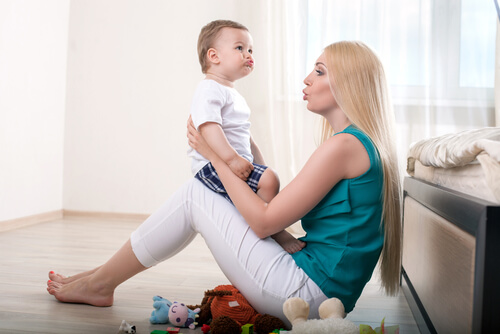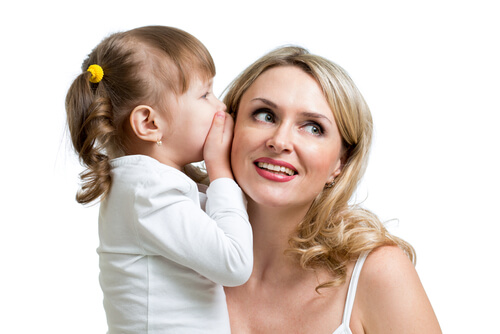The Stages of Language Development in Children 0–6 Years Old


Written and verified by lawyer Francisco María García
During the first years of a child’s life, developmental changes occur at a faster rate than at any other time. Children develop fundamental skills, physically, psychologically and socially. Language development in children 0 to 6 years old shows these rapid and profound changes.
During this stage, children have a natural predisposition to learn. Therefore, early stimulation favors this evolution. The family environment is a key facilitator of these advances.
In terms of language, the people who surround the child have special relevance. For language development in children from 0 to 6 years old, imitation has a great impact, so the models around them will be decisive.
Stages of language development in children 0–6 years old
0–12 months
- This is the “prelinguistic” stage. The child doesn’t use words. It’s a preparatory stage for language as we know it.
- The child still communicates with people. He cries if he’s hungry or cold, or if he needs his diaper changed. He smiles socially and shouts to demand attention.
- There are different cries and shouts. The mother is able to understand each of his messages, knowing whether the cry is for hunger or cold, because each has a different nuance.
- At the end of this stage, the child tests his vocal chords. He babbles, learns to pronounce vowels and some consonants. The sounds “ma” and “pa” that appear have nothing to do with the words “mama” and “papa,” but rather are variations of different sounds.
- Progress continues gradually. At the end of this period, the child understands that there is a relationship between his name and himself. Use simple words. He perfectly understands words that designate important actions. “Give me” and “take” are usually the first ones the child understands.

12–24 months
- In this period, the child understands orders and complies. He’s able to use simple words. Generally, these are nouns that refer to objects.
- He communicates what he wants with words: “no,” “this,” “more.” He can combine two words, a noun and a verb. For example: “mama milk.” He accompanies words with gestures, especially to signal what he wants.
- As he progresses, he’ll manage to repeat some simple songs.
- There are children who reach the end of this period with a very good command of vocabulary and linguistic structures. This evolution depends, to a great extent, on the stimulation they receive from the people in their environment.
For language development in children 0 to 6 years old, imitation has a great impact.
2–6 years
- If the child’s development has been normal, he’ll reach 2 years with a complete development of language skills. He expresses himself naturally and fluently and can communicate exactly what he wants.
- He may still have some problems pronouncing consonant groups, but this trouble will disappear with practice. If it persists, it’s advisable to consult a specialist. She will suggest strategies to help the child overcome the problems early.
- At age 4, the basic linguistic repertoire is complete. The child can combine words in simple sentences. The statements will gradually become more complex and better structured.
- The comprehension level has also improved.

- If contact with books has begun during this evolution, the child will begin to be interested in written language. He’ll recognize that letters compose messages. It’s time to teach him the letter that starts his name, as well as words that are meaningful to him, such as “mom” and “dad.” Approach this task as a game and he’ll have a good start on the path to literacy.
- When he has a storybook in his hands, your child will often ask, “What does it say here?” This question indicates that he recognizes stories are made with words.
How to stimulate language development in children 0 to 6 years old
Helping your child to internalize the understanding and use of language is something that can be achieved through a few simple and everyday tasks.
Here are a few tips:
- Invite him to use language to say what he feels and what he wants.
- Respond to words and not gestures when he asks you for something.
- Teach songs, rhymes and poems.
- Read him long stories.
- Talk to your child without using childish words.
It’s important not to underestimate a child’s linguistic capacity and remember that he understands much more than he speaks.
During the first years of a child’s life, developmental changes occur at a faster rate than at any other time. Children develop fundamental skills, physically, psychologically and socially. Language development in children 0 to 6 years old shows these rapid and profound changes.
During this stage, children have a natural predisposition to learn. Therefore, early stimulation favors this evolution. The family environment is a key facilitator of these advances.
In terms of language, the people who surround the child have special relevance. For language development in children from 0 to 6 years old, imitation has a great impact, so the models around them will be decisive.
Stages of language development in children 0–6 years old
0–12 months
- This is the “prelinguistic” stage. The child doesn’t use words. It’s a preparatory stage for language as we know it.
- The child still communicates with people. He cries if he’s hungry or cold, or if he needs his diaper changed. He smiles socially and shouts to demand attention.
- There are different cries and shouts. The mother is able to understand each of his messages, knowing whether the cry is for hunger or cold, because each has a different nuance.
- At the end of this stage, the child tests his vocal chords. He babbles, learns to pronounce vowels and some consonants. The sounds “ma” and “pa” that appear have nothing to do with the words “mama” and “papa,” but rather are variations of different sounds.
- Progress continues gradually. At the end of this period, the child understands that there is a relationship between his name and himself. Use simple words. He perfectly understands words that designate important actions. “Give me” and “take” are usually the first ones the child understands.

12–24 months
- In this period, the child understands orders and complies. He’s able to use simple words. Generally, these are nouns that refer to objects.
- He communicates what he wants with words: “no,” “this,” “more.” He can combine two words, a noun and a verb. For example: “mama milk.” He accompanies words with gestures, especially to signal what he wants.
- As he progresses, he’ll manage to repeat some simple songs.
- There are children who reach the end of this period with a very good command of vocabulary and linguistic structures. This evolution depends, to a great extent, on the stimulation they receive from the people in their environment.
For language development in children 0 to 6 years old, imitation has a great impact.
2–6 years
- If the child’s development has been normal, he’ll reach 2 years with a complete development of language skills. He expresses himself naturally and fluently and can communicate exactly what he wants.
- He may still have some problems pronouncing consonant groups, but this trouble will disappear with practice. If it persists, it’s advisable to consult a specialist. She will suggest strategies to help the child overcome the problems early.
- At age 4, the basic linguistic repertoire is complete. The child can combine words in simple sentences. The statements will gradually become more complex and better structured.
- The comprehension level has also improved.

- If contact with books has begun during this evolution, the child will begin to be interested in written language. He’ll recognize that letters compose messages. It’s time to teach him the letter that starts his name, as well as words that are meaningful to him, such as “mom” and “dad.” Approach this task as a game and he’ll have a good start on the path to literacy.
- When he has a storybook in his hands, your child will often ask, “What does it say here?” This question indicates that he recognizes stories are made with words.
How to stimulate language development in children 0 to 6 years old
Helping your child to internalize the understanding and use of language is something that can be achieved through a few simple and everyday tasks.
Here are a few tips:
- Invite him to use language to say what he feels and what he wants.
- Respond to words and not gestures when he asks you for something.
- Teach songs, rhymes and poems.
- Read him long stories.
- Talk to your child without using childish words.
It’s important not to underestimate a child’s linguistic capacity and remember that he understands much more than he speaks.
All cited sources were thoroughly reviewed by our team to ensure their quality, reliability, currency, and validity. The bibliography of this article was considered reliable and of academic or scientific accuracy.
- Cerdas Núñez, J., & Murillo Rojas, M. (2017). El desarrollo del lenguaje en los primeros cuatro años de vida: cómo favorecerlo desde la cotidianidad del espacio educativo. Revista electrónica leer, escribir y descubrir, 1(2), 3. https://digitalcommons.fiu.edu/cgi/viewcontent.cgi?article=1000&context=led
-
Dannequin, C. (1989). La expresión lingüística de los niños pequeños. CL & E: Comunicación, lenguaje y educación, (2), 7-12. https://dialnet.unirioja.es/descarga/articulo/126169.pdf
- Guarneros Reyes, E., & Vega Pérez, L. (2014). Habilidades lingüísticas orales y escritas para la lectura y escritura en niños preescolares. Avances en psicología latinoamericana, 32(1), 21-35. https://revistas.urosario.edu.co/index.php/apl/article/view/apl32.1.2014.02/pdf
- Jiménez Rodríguez, J. (2010). Adquisición y desarrollo del lenguaje. Psicología del desarrollo en la etapa infantil.
- Molina, M., Ampudia, M., Aguas, S., Guasch, L., & Tomás, J. (1999). Desarrollo del lenguaje. Actitudes educativas, trastornos del lenguaje y otras alteraciones en la infancia y la adolescencia, Barcelona, Laertes, 15-27. http://www.centrelondres94.com/files/desarrollo_del_lenguaje_2.pdf
- Pulido, M. D. M. C. (2010). Características generales del niño y niña de cero a seis años. Revista de Innovación y experiencias educativas, 36, 1-12. https://archivos.csif.es/archivos/andalucia/ensenanza/revistas/csicsif/revista/pdf/Numero_36/MARIA_DEL_MAR_CANETE_PULIDO_02.pdf
- Rodríguez, J. J., & Santana, A. M. M. (2010). Adquisición y desarrollo del lenguaje. A.(. Muñóz García, Psicología del desarrollo en la etapa de educación infantil, 101-120.
This text is provided for informational purposes only and does not replace consultation with a professional. If in doubt, consult your specialist.








